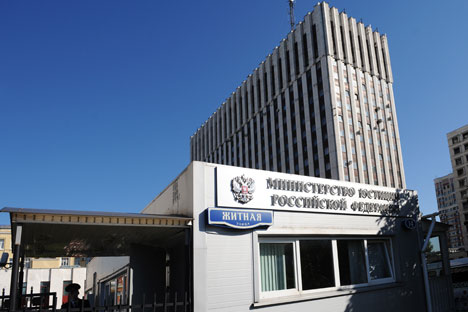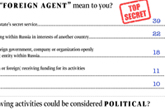Authorities on the lookout for “foreign agents” among NGOs

Ministry of Justice of the Russian Federation. Source: Gridoy Sysoev / RIA Novosti
The Russian Justice Ministry and the Public Prosecutor’s Office have announced their intention to check up on how the so-called Law on Foreign Agents is being enforced. Representatives of NGOs are living in fear of lawsuits.
Human rights activists say more than 40 organisations in 16 Russian regions have already undergone checks. These include the Russian office of Amnesty International and the famous human rights organization Memorial, which studies and collects documents connected with the history of repression during the Soviet period and also investigates human rights violations in war zones.
In its announcement concerning “foreign agents,” the Public Prosecutor’s Office noted that these checks were of a standard nature and that their aim was “to check up on adherence to the law in the activities of non-commercial organizations financed by foreign sources.” The Justice Ministry added that these mass checks of NGOs were being conducted in order to uncover organisations which fit the description of “foreign agents.”
In some regions officials from the local prosecutor’s office maintain that the checks are being conducted in order to determine whether the activities of NGOs conform to legislation on fighting extremism.
Human rights activists are inclined to link these searches by the Public Prosecutor’s Office and the Justice Ministry with a desire on the part of government authorities to activate recent amendments to the Law on NGOs which went into effect on November 21, 2012 and are better known as the “Law on Foreign Agents”. These amendments instruct all NGOs receiving funds from abroad and participating in political activities to register with the Justice Ministry as “foreign agents”. These “foreign agents” will then be subject to strict rules and control by the authorities.
Not a single NGO in Russia has deemed it necessary to register with the Justice Ministry. The concept of “foreign agents” has highly unpleasant connotations in the Russian language. The terminology used in the amendments was presumably borrowed from the Foreign Agents Registration Act (FARA) enacted in 1938 in the United States. However, what is apparently a fairly neutral legal term in America has an absolutely distinct emotional colouring in Russian. The term “foreign agent” is traditionally used with respect to spies. Consequently, many human rights NGOs see in the demand to call themselves “foreign agents” an intentional and calculating humiliation.
Many non-commercial organizations, including the Moscow Helsinki Group, Memorial, Golos, Civil Assistance and For Human Rights have refused to respect the demands of the law. In February, 11 NGOs sent a complaint about the “Law on Foreign Agents” to the European Court of Human Rights.
“This law is absurd even from a legal standpoint,” said Boris Kagarlitsky, director of the Institute of Globalization Studies and Social Movements. “The law can oblige us to do something or not to do it. But I don’t understand the law that demands that we call ourselves by a special name and make this known to the state organs.”
Related:
NGO funding at risk as pressure increases
Three-time world chess champion suspected of being 'foreign agent'
Boris Belenkin, a board member at Memorial, is sure that the current wave of checks is a reaction to Vladimir Putin’s words to his colleagues at the FSB on February 14 of this year. The Russian President said that the new laws on NGOs “must be enforced unconditionally”.
“The criteria according to which one may consider or not consider an organisation a ‘foreign agent’ are very vague,” said Belenkin. “At the Justice Ministry, which is obliged to keep the new register, people could not imagine for a long time according to what formal signs an organisation should be included in the register. I don’t rule out the possibility that these mass checks are being carried out now in part because they have finally come up with the necessary criteria. Or they’ll develop them after the checks — depending on what they manage to find.”
Belenkin added that this wave of checks will in all likelihood be followed by a wave of lawsuits, some prompted by violations of the “Law on Foreign Agents”, but others prompted by other violations, given the scale of the checks and the number of different organs doing the checking. “Memorial,” he said, “is ready for these sessions. It only hopes that the courts will be objective.”
First published in the RT.com.
All rights reserved by Rossiyskaya Gazeta.
Subscribe
to our newsletter!
Get the week's best stories straight to your inbox
